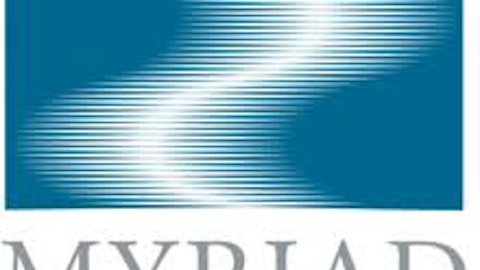There’s little denying that Roche Holding Ltd. (ADR) (OTCBB:RHHBY)‘s cancer wonder drug Avastin has been a godsend to cancer patients and investors alike.
Avastin — which the Food and Drug Administration has approved to treat metastatic colorectal cancer (as a first-line and second-line treatment), metastatic HER2-negative breast cancer, and metastatic renal cell carcinoma, and as a second-line treatment of glioblastoma — brought in $5.8 billion in sales worldwide in 2012, up 6% from the previous year. Avastin is part of a class of drugs known as angiogenic inhibitors. Simply put, these drugs bind to receptors often linked to blood vessel growth. By inhibiting blood vessel growth, drugs like Avastin help starve solid tumors of the nutrients they need to grow. Avastin, for instance, works by binding to VEGF-receptors to inhibit blood vessel growth to solid tumors.
The marvel of angiogenic inhibitors

Also, because angiogenic inhibitors don’t directly kill tumors or surrounding tissue, and instead simply inhibit blood vessel formation, they can be used for long periods of time compared with standard chemotherapy, which often leads to intolerable toxicity.
This is why, with the American Society of Clinical Oncology’s annual meeting just two weeks away, it’s time to put angiogenic inhibitors on your radar. ASCO’s annual meeting is the holy grail of scientific conferences for oncology-based biotech and pharmaceutical companies, and it should give us a good indication of what’s working and what isn’t within certain drug classes. As for me, I’ll certainly have my eye on some early stage anti-angiogenesis drugs.
What to watch at ASCO
Regeneron Pharmaceuticals Inc (NASDAQ:REGN), perhaps best known for its highly successful wet age-related macular degeneration drug Eylea, released two promising abstracts for ASCO on monoclonal antibodies with potential anti-angiogenic effects.
A phase 1 study of REGN421, a monoclonal antibody to delta-like-ligand 4 (DLL4), in combination with SAR153193 from Sanofi SA (ADR) (NYSE:SNY), which Regeneron has partnered with, concluded the combination to be safe despite a relative high level of grade 3/4 adverse events, and noted that responses and prolonged stable disease were witnessed in ovarian cancer patients.
The other abstract involves Regeneron Pharmaceuticals Inc (NASDAQ:REGN)’s REGN910 and Sanofi SA (ADR) (NYSE:SNY)’s SAR307746. This is a fully human and selective angiopoietin-2 monoclonal antibody that blocks signaling in the Tie2 receptors and has the potential to help patients with advanced solid tumors. Of particular interest, no grade 3 or above adverse events were noted among 37 patients, and one thyroid cancer patient was observed as having stable disease for 46 weeks. It certainly appears to be a good candidate to move to phase 2 trials, and one that could benefit as a combination therapy with existing chemotherapy agents.
Pfizer Inc. (NYSE:PFE) is also getting in the action with its phase 1b trial of CVX-060 in combination Inlyta, with its FDA-approved drug. Inlyta is a VEGF-inhibitor approved as a second-line treatment for metastatic renal cell carcinoma, while CVX-060 is a humanized monoclonal antibody fused to angiopoietin-2 binding peptides. The thinking is that the resistance to VEGF therapies that tumors develop can be overcome by these angiopoietin-2 binding peptides. Of the 18 patients in trial, two had a partial response and one an unconfirmed partial response. However, higher-than-expected treatment-related thromboembolic events were a cause for concern that may require further dosing studies before even considering a move on to phase 2 studies.


